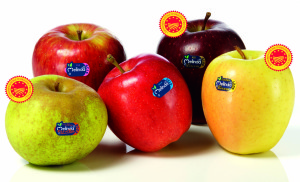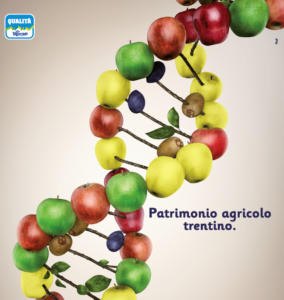 Trent Province’s fruit industry has for decades been in the vanguard of sustainability as the guideline of production. The merging of these producer organisations in Apot has put them at the forefront of crop management practices and support measures for growers in cooperation with Esat, the agency for agriculture development in Trent, and Fem, the Edmund Mach Foundation at San Michele all’Adige. Apot’s top executives, president Ennio Magnani and managing director Alessandro Dalpiaz, are a hands-on team, and we spoke with them about current trade issues.
Trent Province’s fruit industry has for decades been in the vanguard of sustainability as the guideline of production. The merging of these producer organisations in Apot has put them at the forefront of crop management practices and support measures for growers in cooperation with Esat, the agency for agriculture development in Trent, and Fem, the Edmund Mach Foundation at San Michele all’Adige. Apot’s top executives, president Ennio Magnani and managing director Alessandro Dalpiaz, are a hands-on team, and we spoke with them about current trade issues.
The Berlin show is a global fruit industry spotlight. What are you planning for it this year?
We’ll be attending as Apot with our usual stand in the Spazio Trentino area. ‘We’ in this case means Melinda and La Trentina consortia plus Sant’Orsola, the lone wolf, in conjunction with Trentino Marketing. It’s a tailored format that gives us time for individual business-to-business meetings while providing high-quality common services spotlighting to perfection Trent, its fruit trade and those who make its business their business. Everyone in the supply chain likes the formula and what it delivers when it comes to contacts and market opportunities.
 What about this year’s apple crop, say, when it comes to flavour and health?
What about this year’s apple crop, say, when it comes to flavour and health?
The 2016 season’s been particularly good as to both fruit quality and quantity. The taste and flavour characters per- ceived by the market more than measure up to expecta- tions. Even shelf-life is better than it was for last year’s crop.
What about the monitoring data Apot collects during the season on grower compliance with the strict national and provincial integrated production rules?
A healthy crop makes the market. So, we follow a specific programme in monitoring to check grower compliance on the use of sprays and residues. This year we collected 904 samples and ran 198,307 tests on active ingredients. The method we use is a statistical model that has a 97.5% rate of reliability. We found only 3 cases of non-compliance and had those apples withdrawn before reaching the market. We’ve collected 13,769 samples and run 2,269,434 tests for active ingredients over the last 14 years.
 How did the first part of the marketing season go this year for both the domestic and export trade?
How did the first part of the marketing season go this year for both the domestic and export trade?
So far it’s been what you can call a good year. The overall crop in the EU is down about 800 thousand tons compared to last year’s supply volume, and early season demand was solid for Gala, Red Delicious and Granny Smith. We’re now beginning to see pretty good indicators for Fuji, a later variety. The domestic mar ket has shown a good response to Golden Delicious, with supply volumes still in line with retail demand. The picture for the export trade, however, is blurred by the volatile socio-political situation in certain North African countries, especially Algeria and Egypt. So far, though, the slack there has been taken up by extra volumes that are being exported to the Middle East. There’s also been some increase in trade with customers in South America, but that’s essentially a stop-gap effort. It won’t amount to a real boost in receipts because those countries will begin picking their apples for market come early February.
Are you saying that the optimistic pre-season projec- tions regarding farmgate prices and market demand are running true to form?
We’ve been seeing a slight rebound in average prices paid to growers over what they received last year. That’s in line with the initial estimates market observers and analysts came up with. Right now we’re more concerned about the clouds converging on the export horizon we’ve just talked about, as well as the loss of Russia due to the continuing embargo. Taken together, these ‘problem’ markets account for about 10% of our export volumes, so we need to find alternative outlets we can count on as soon as possible. As a matter of fact, the talks that have been going on with Viet- nam and Taiwan are making good progress and discussions with China to open access to that market have started. All of these steps add up to a strategic necessity when you’re dealing with unstable market situations that develop in un- foreseen and uncontrollable ways. It’s a quandary that the competent government authorities have to tackle by find- ing the most appropriate approaches and measures to keep trade flows travelling and moving in the right direction.
